Last Updated on April 25, 2024
According to Migration Data Portal’s recent report, there are about 6.3 million foreign students studying in different parts of the world. Within these massive statistics, did you know that more than one in six overseas students came from just one country? If you guessed China, you got it right!
It’s no secret that the country has a vast population. The economic prosperity and the cultural importance of education in China undoubtedly make the Middle Kingdom the largest market for overseas schools looking to get foreign students enrolled in their programs.
The only problem is that their communication and digital landscape differ from other countries. So if you want to promote international schools in China, getting expert insights is necessary to understand the Chinese education market and the complexity of China’s educational system.
Fortunately for you, this article will introduce the lay of the land – the sector’s who, where, what, and why – and then an overview of how to start promoting overseas schools in China.
Key Points
- The international education market in China will continue to expand due to the country’s growing population, economic prosperity, and emphasis on academic excellence.
- Chinese High School students keen on studying abroad are often influenced by their parents and other elders in the family.
- Local tertiary and secondary education only highlights fields like STEM, finance, accounting, business management, and marketing.
- The highest concentration of students looking to study overseas is in “first-tier” cities, but international institutions can still attract enrolled students from rural schools.
- Upcoming undergraduate students consider the UK, Canada, Australia, and the US the top education systems they want to explore abroad.
Navigating the International Education Market In China
Who
When promoting your school in China, you must remember that your target audience is not just foreign students but also their parents.
Their culture, as well as the Chinese education system, are massively influenced by Confucianism. Because of this, parents are very involved in their child’s learning journey from primary school to higher education. The wisdom they obtained from this cultural belief led them to invest money and time to secure the future of the Chinese youth within their family.
They also place significant importance on early childhood learning. Because of this, a child’s academic preparation doesn’t just start in elementary school, but preschool education. Although some schools have more play-based or child-centered methods, the belief that early academic success will pave the way for future achievements is still the bread and butter of many local institutions today.
The societal and parental pressures to excel academically will consistently grow from finishing elementary school to finding suitable tertiary education options to catapult their child into the global job market. And while most Chinese parents often send their kids to local schools for primary and secondary education, some consider international institutions better choices than Chinese universities.
Besides gaining independence and global insights, these parents believe that students attending school abroad after a nine-year compulsory education will have a higher chance of achieving economic success.
The competitive nature of the Chinese education system, from elementary school to higher education, leads a number of students to believe that they’ll thrive more when they attend school in an international setting instead of typical Chinese universities.
Once they become university graduates, the cultural norm dictates that the nurtured child will be responsible for their parents’ financial needs. Due to these reasons, overseas schools must prove they offer better opportunities and environments than the local education system if they want more Chinese students enrolled on their campuses.

Source: USAHello.org
Where
Based on a recent survey by The Pie News, most of the Chinese students they asked prefer to pursue tertiary education in the UK, Canada, Australia, and the US.
Meanwhile, the number of students with the highest interest in studying abroad belongs in ‘first tier‘ cities such as Shanghai, Beijing, and Guangzhou.
If you look closely at the urban structure of education in China, you’ll see that these cities boast a plethora of international schools and exhibit a greater openness to Western cultures.
Thanks to the increasing household income nationwide, most families with kids attending local primary schools and high schools are more financially capable of sending students abroad to study in higher education institutions.
Like everywhere else in the world, the system of education in China now extends online. With your target audience virtually present, the number of students you can reach is no longer limited to the first-tier cities.
You can also expand your search to middle and high schools within the rural areas. Schools abroad can tap into emerging markets across China, leveraging the country’s growing prosperity and connectivity to attract a broader range of students seeking international education.
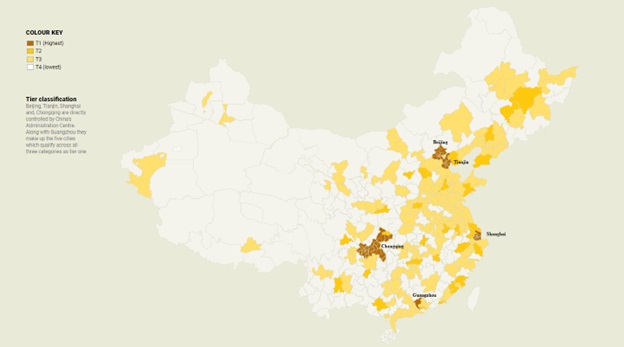
City tiers. Source: scmp.com
What
The typical Chinese student must attend at least nine years of basic education in China. This law covers all the miscellaneous and tuition fees a child may incur from primary school to middle school.
After completing compulsory primary education, that’s the time frame when most parents choose to send their children abroad primarily for secondary and tertiary education.
When promoting upper secondary education abroad, you can highlight that overseas institutions offer a unique alternative to standardized education in China. Unlike traditional middle school education, international secondary schools promote a more holistic approach to education, emphasizing personal development, critical thinking, creativity, and extracurricular activities.
You may not know, but the local education system typically prepares children to take the Chinese university academic examination from the moment they enter secondary school levels.
The ‘gaokao’ or ‘higher education exam’ focuses on STEM subjects, finance, accounting, business management, and marketing. Because of this, senior high school students seeking tertiary education locally often find themselves pursuing programs within these limited fields.

Proportion of majors studied by Chinese students. Source: Youth-time.eu
Why
According to Statista, the two primary motivations why Chinese students study abroad are expanding international horizons and enriching personal experiences they can’t gain within China’s current education system.
Foreign students also said practical considerations such as learning language skills and improving job perspectives convinced them to study in international institutions. It’s worth noting that these are responses from students, not their parents.
No matter what foreign students think about the state of education in China, parents are often the ones weighing this decision with more practical considerations in mind.
Nevertheless, looking at the graph will give you an idea that the students enrolled in China’s compulsory education system highly regarded international schools as havens of new knowledge and experiences.
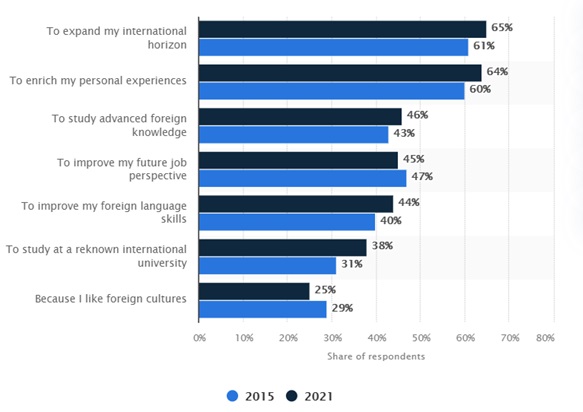
Source: Statista.com
How To Promote International Schools in China
After evaluating the abovementioned factors, the vital question is how can you promote overseas schools in China? Read along as we get down to the nuts and bolts of the topic.
Chinese Website Localization for Effective School Promotions
Promoting anything in China aims to create a digital channel where potential customers can find your business.
The school’s website lies at the heart of this strategy. It is the core to which all points of contact are directed, where students and parents alike will form their impressions about the school and decide whether to get in touch or apply.
If you want to succeed in attracting foreign students, simply translating the original school website will not suffice. Remember that Chinese audiences expect a different user experience and interface style when they access your site.
For the students to consider your institution over schools in China, they must access high volumes of information about the business. These details include the school’s history, faculties, specialisms, and snapshots of the student experience. It is only possible with reliable and consistent website localization methods.

Source: Baidu.com
Strategies to Improve Search Engine Rankings on Baidu
Besides designing and maintaining the school’s website, you must know how it will rank in the results returned by China’s most popular search engine, Baidu. Here are a few methods you can try to increase the number of students and parents you can reach:
- Keyword Research: Baidu places a high value on finding keywords on a website and matching them with search terms. Fortunately for those unfamiliar with the strategy, the platform can provide a tool, ‘Baidu Keyword Planner, ‘ which can be used to check average daily search volumes, popular keywords, and competition levels.
- Web Hosting inside China: Having a .cn domain, and hosting website data in China, is vital to ranking well on Baidu. It also gives your website more credibility in the Chinese market. For further authenticity, your school must procure an ICP license, which can be found in our Ultimate Guide for China Website Localization.
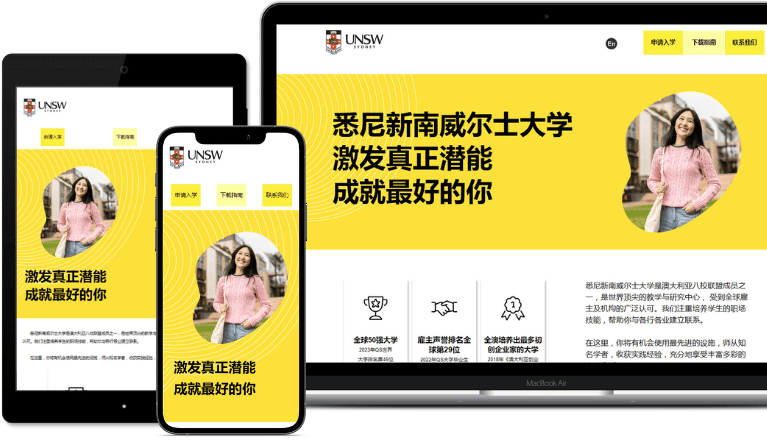
UNSW’s Chinese responsive website for China
- Responsive Design: It means optimizing your website to cater to the needs of mobile users. With most Chinese netizens accessing the web via their smartphones, making your business website mobile-friendly is a step you can’t skip. You may not know, but more than 90% of teens in China have access to mobile internet. It means that the number of students that can access your website (once optimized) will increase, so it pays to have a responsive design to meet their expectations.
- Leverage Pay-Per-Click (PPC) Advertising: While appearing in organic search results is desirable, PPC advertising can complement your organic efforts and boost your visibility on Baidu. Baidu offers various advertising models, such as Baidu Tuiguang and Baidu Brand Zone, which allow you to display targeted ads to users searching for relevant keywords. You can view our guide to Baidu and its advertising models for more details.
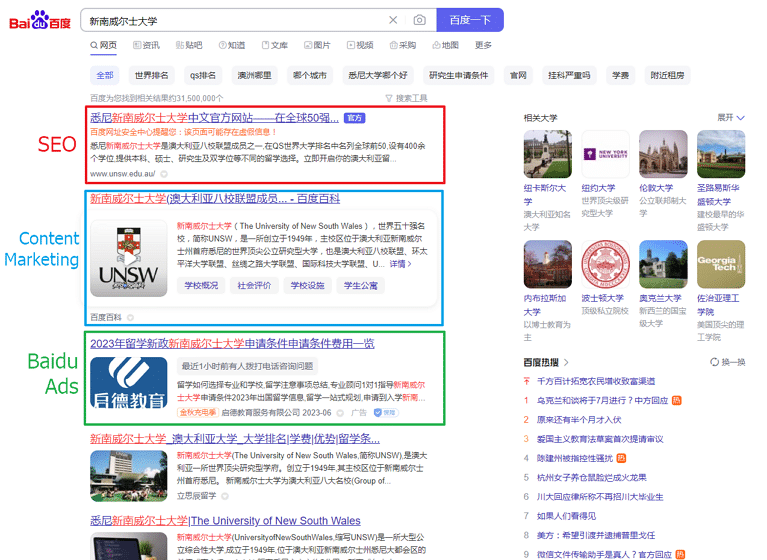
- Implement Search Engine Optimization (SEO) Strategies: Besides keyword optimization, various on-page and off-page SEO techniques can improve your website’s visibility on Baidu. It includes optimizing meta tags, headings, image alt tags, and URLs and creating high-quality, informative content that appeals to your target audience. Building backlinks from reputable Chinese websites and directories can also enhance your website’s authority and visibility on Baidu. Remember, search engine optimization is an ongoing process, and it’s essential to regularly monitor your website’s performance, analyze search analytics data, and refine your strategies to adapt to changing algorithms and user behavior.
By implementing these strategies and continuously optimizing your website for Baidu, you can increase your chances of ranking higher in search results and attracting a larger audience of students and parents in China.
Building a Strong Online Reputation for the School
If you want to enhance the school’s credibility, your business must utilize external channels by issuing press releases and engaging on local education forums.
Having a steady stream of stories about your school can prove incredibly valuable. Remember that there are many overseas schools, so it can be challenging for local students and parents to bear them all in mind. The first step in brand recognition is awareness. Here are a few ideas you can integrate into your strategy:
- University Graduates and Success Stories: If you already have university graduates from China, you can showcase their stories and achievements at the institution. Remember to highlight the positive testimonials in your social media channels and website because this can attract people seeking tertiary education abroad.
- Cultural Exchange Programs and Events: Education in China is highly valued, so organizing cultural exchange programs and events will convince students and parents that your institution is willing to foster mutual understanding and cultural appreciation.
- Partnerships with Chinese Institutions: Partnerships with local middle and high schools will give you more chances to interact with your target market. Organizing an online promotional event can increase the number of students interested in studying abroad.
Leveraging Social Media Channels
Social media has become essential for promoting overseas schools to Chinese students and parents in the digital era. One platform that stands out for its immense popularity and effectiveness in building communities is WeChat.
Operating a WeChat account allows overseas schools to connect with their target audience meaningfully and engagingly. Here’s a brief discussion on leveraging WeChat and other social media platforms:
-
How to Create Brand Communities with WeChat?
You can create a brand community in WeChat for your school by establishing an official account on this platform. Schools can engage with their target audience and build a sense of belonging through this channel.
Now, what content features can you craft to make this happen? Here are a few ideas:
- Publishing Articles
Regularly sharing informative and relevant articles on WeChat helps to showcase the school’s expertise, educational philosophy, success stories, and campus life. These articles can cover various topics, such as study abroad tips, career guidance, faculty interviews, and content featuring university graduates. Providing valuable content establishes the school as a thought leader and resource for students and parents.

Sup de Luxe Paris on WeChat, posts and group chat
- Hosting WeChat Groups
Creating dedicated WeChat groups allows for direct communication and interaction with prospective students, current students, parents, and alums. These groups can be platforms for discussions, Q&A sessions, networking opportunities, and sharing experiences. You can utilize this feature to gain insight into your audience’s preferences, especially those interested in pursuing higher education overseas.
Schools can also assign staff members or student ambassadors to moderate and facilitate these groups, ensuring a positive and engaging environment.
- Organizing Online Events
WeChat provides features for organizing virtual events, such as webinars, panel discussions, workshops, and virtual campus tours. These events allow schools to showcase their facilities, academic programs, and faculty expertise to a broader audience. Interactive sessions and live Q&A segments can further enhance engagement and provide an opportunity for direct communication with participants.
-
Other Social Media Channels You Can Consider
In addition to WeChat, the primary platform for community building, several other social media channels in China can effectively promote overseas schools and engage with a broader audience. Here are some notable options to consider:
- Douyin (known as TikTok outside China): This short-video platform offers an opportunity for schools to showcase campus culture, student life, and interactive educational content through engaging and visually appealing videos. By creating entertaining and informative content, schools can attract the attention of prospective students and build brand awareness among a tech-savvy demographic.
- Xiaohongshu (Little Red Book): Xiaohongshu is a social e-commerce platform combining content sharing and online shopping elements. It strongly influences consumer behavior, especially in the beauty, fashion, and lifestyle sectors. Schools can tap into this platform to provide insights into campus life, share student experiences, and create content related to student interests. By engaging with Xiaohongshu’s community, schools can build a positive brand image and attract students who align with their values and offerings.
- Weibo: Schools can leverage Weibo to share concise updates, news, and announcements, reaching a broader audience beyond their immediate community. Weibo allows for quick dissemination of information and can effectively generate buzz and increase the number of students interested in your institution.

- Bilibili: Schools can create educational and informative content related to their programs, campus facilities, and extracurricular activities featuring foreign students studying in the institution to appeal to this audience. Collaborating with popular Bilibili creators or sponsoring relevant content can also help expand reach and engagement.
- QQ and QQ Groups: You can start virtual communities within the platform where members can interact, share information, and discuss specific topics of interest. Besides facilitating communication and addressing inquiries, this channel can be a platform for prospective students and parents to connect with program and university graduates from your school.
By strategically utilizing social media platforms, international schools can leverage the power of community building, engage with their target audience, establish brand loyalty, and ultimately attract more Chinese students.
It’s essential to tailor content, language, and communication style to align with the preferences and cultural nuances of the Chinese audience, ensuring an effective and impactful social media presence.
The Growing Popularity of Online Education in China
The recent pandemic has sent many undergraduate students back to their hometowns, so adopting online education is a timely solution for overseas schools to gain new foreign enrollees.
While this won’t add to the foreign students studying on the actual campuses, the increasing interest in virtual learning channels can help you stay ahead of the competition. Collaborating with reputable online education platforms in China will allow schools to offer courses or specialized programs to a wider audience. Through this, you can attract students who prefer the convenience and flexibility of online learning.
Schools can also participate in virtual events, webinars, or workshops featuring renowned educators, often organized by online education platforms. This involvement helps to establish the school’s authority and builds credibility within the community. Besides that, events like these can help you reach younger students from primary schools.
Ready to Dominate the Education Market in China? Get in Touch with Us Today!
As the Chinese overseas education market flourishes, you must tailor your approach to the unique preferences of your target market. With the increasing credibility and demand for international institutions, your time to be an educational industry leader in China begins now!
Armed with a profound understanding of local consumer preferences, cultural intricacies, and ever-evolving behavioral patterns, we stand ready to guide your business to achieve its maximum potential.
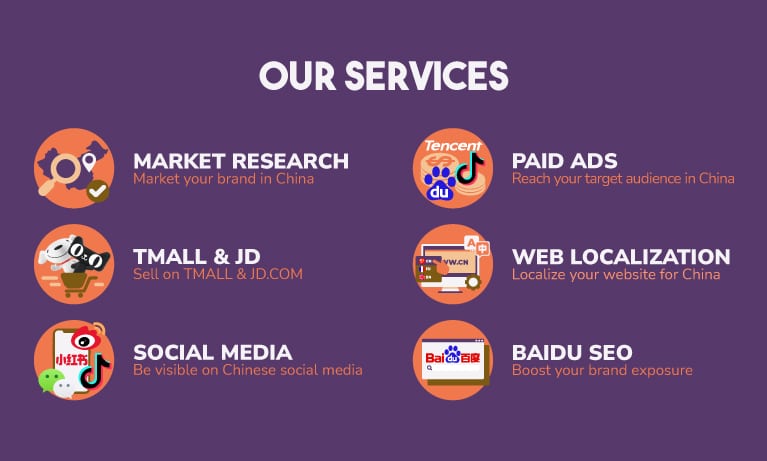
At Sekkei Digital Group, we pride ourselves on delivering exceptional digital marketing and advertising solutions to help your brand stand out within the Chinese Market. We focus on providing measurable results by building a formidable online presence, crafting captivating branding and positioning strategies, and carving out a unique space that sets you apart from the competition.
Our team consists of seasoned experts has the necessary experience and knowledge to thrive in this lucrative yet intricate market. Contact us today, and let the path to Chinese overseas education industry dominance begins!


